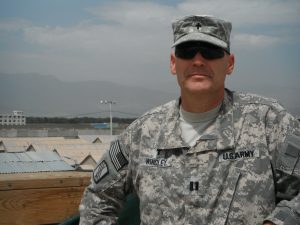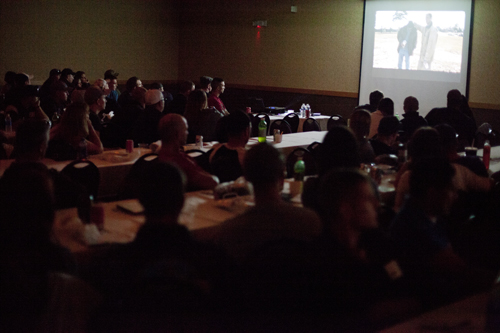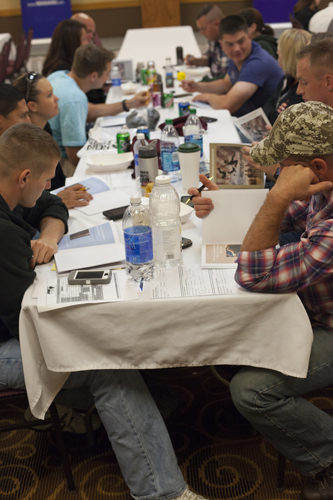By Erin Kennedy
In the midst of sleep during a 2012 deployment to Kuwait, Army Chaplain (Capt.) Doug Windley was awoken by a call from the Red Cross informing him that the brother of one of his soldiers had been murdered back home.

Army Chaplain (Capt.) Doug Windley, shown here in Kandahar, served with the North Carolina National Guard in Kuwait, Afghanistan and Qatar.
Windley, of the North Carolina National Guard, left his tent at 3:00 a.m. to wake the soldier, one of many times in the chaplain’s career that he was called upon to deliver grim news.
“I’ve never found a phrase or words that have the power to take away someone’s pain,” Windley said. “Just being present with them and not leaving them alone is the best thing to do.”
Windley’s experiences as a military chaplain in North Carolina and on deployment in Kuwait, Afghanistan and Qatar have brought him to his work as a staff associate of the Survivor Care Team at Tragedy Assistance Program for Survivors (TAPS).
TAPS, based out of Arlington, Va., is a 24/7 program that helps people who have experienced the death of a loved one in the military, regardless of their relationship to the individual who passed away.
As a chaplain on deployment, Windley served as a pastor for soldiers overseas. He performed religious services for soldiers who followed Christianity, as he did, and provided a place of worship for soldiers of other religions as well. Since returning to North Carolina at the end of 2012, Windley continues his work by marrying soldiers, being there for the birth of a soldier’s child, attending soldiers’ funerals, and helping soldiers adjust to life at home after returning from deployment.
“There are three phrases I always keep in the back of my mind as a chaplain: nurture the living, care for the wounded and honor the dead,” Windley said.
At TAPS, Windley provides support and care to those left behind after a suicide by helping them through their grieving.
Since 2010, suicide has been the second-leading cause of death for service members, with war injuries at number one, the Armed Forces Health Surveillance Center (AFHSC) found.
According to data collected over eight months by Arizona State University’s News21, veterans are killing themselves at more than double the rate of the civilian population with about 49,000 taking their own lives between 2005 and 2011.
Records from 48 states show the annual suicide rate among veterans is about 30 for every 100,000 of the population, compared to a civilian rate of about 14 per 100,000. The suicide rate among veterans increased an average 2.6 percent a year from 2005 to 2011, or more than double that of the 1.1 percent civilian rate, according to News21’s analysis.
Like TAPS, Cheryle Phelan, suicide prevention coordinator at the Department of Veterans Affairs in Prescott, Ariz., helps connect survivors with other survivors. When a veteran suicide occurs in the region of northern Arizona, Phelan calls the family to give them contact information for survivors in regional suicide groups.
“It’s different when someone dies from cancer or a different disease,” Phelan said. “When someone dies of suicide, family and friends are always thinking ‘What should I have done?’ ”
By connecting a newer survivor with someone such as an older veteran spouse affected by a military suicide in the past, the newer survivor learns how to cope better and is assured they can make it through the death, Phelan says.
“With suicide, it’s important that the survivors are around people that can really empathize with them,” Phelan said.
Windley refers to the process of new people and organizations offering support to survivors as the “address book changing.”
“Suicide is an enigma to many people,” Windley said. “I want to run to them to help in the moment; I want to run toward the fire.”



